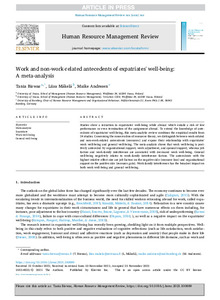Work and non-work-related antecedents of expatriates' well-being : A meta-analysis
Biswas, Tania; Mäkelä, Liisa; Andresen, Maike (2021-12-29)
Biswas, Tania
Mäkelä, Liisa
Andresen, Maike
Elsevier
29.12.2021
Julkaisun pysyvä osoite on
https://urn.fi/URN:NBN:fi-fe2022022320625
https://urn.fi/URN:NBN:fi-fe2022022320625
Kuvaus
vertaisarvioitu
© 2021 The Authors. Published by Elsevier Inc. This is an open access article under the CC BY license (http://creativecommons.org/licenses/by/4.0/).
The author gratefully acknowledges funding from the European Union's Horizon 2020 research and innovation programme under the Marie Skłodowska-Curie Actions grant agreement No. 765355 (GLOMO, “Global Mobility of Employees”, https://glomo.eu/ ).
© 2021 The Authors. Published by Elsevier Inc. This is an open access article under the CC BY license (http://creativecommons.org/licenses/by/4.0/).
The author gratefully acknowledges funding from the European Union's Horizon 2020 research and innovation programme under the Marie Skłodowska-Curie Actions grant agreement No. 765355 (GLOMO, “Global Mobility of Employees”, https://glomo.eu/ ).
Tiivistelmä
Studies show a reduction in expatriates' well-being while abroad which entails a risk of low performance or even termination of the assignment abroad. To extend the knowledge of antecedents of expatriates' well-being, this meta-analytic review combines the empirical results from 24 studies. Concerning the conservation of resources theory, we distinguish between work-related and non-work-related antecedents (resources) and expose their relationship with expatriates' work well-being and general well-being. The meta-analysis shows that work well-being is positively anteceded by organizational support, work adjustment, and spousal support, whereas job factors and work-family interference are associated with decreased work well-being. General well-being negatively relates to work-family interference factors. The antecedents with the highest relative effect size are job factors on the negative side (resource loss) and organizational support on the positive side (resource gain). Work-family interference has the broadest impact on both work well-being and general well-being.
Kokoelmat
- Artikkelit [2621]
